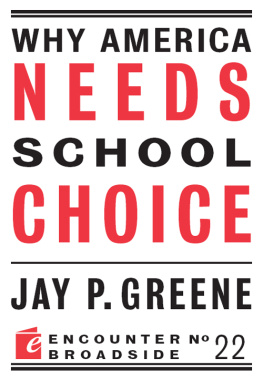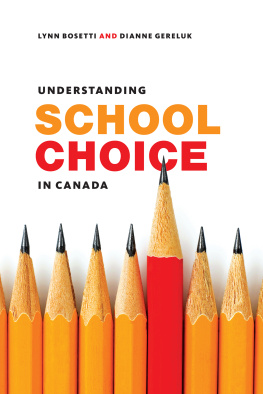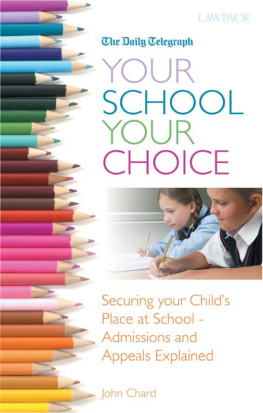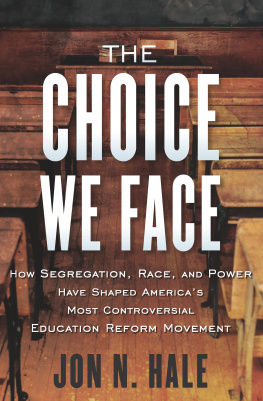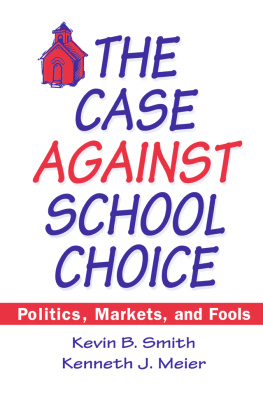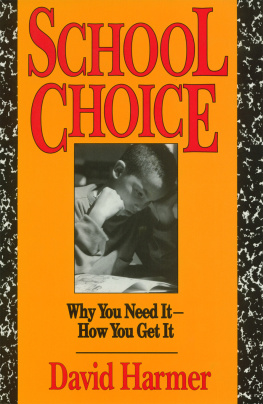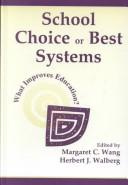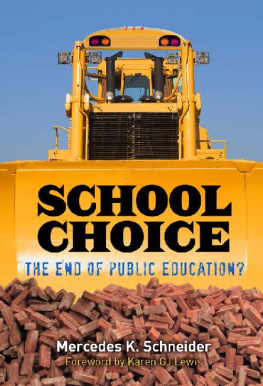I NTRODUCTION
T HE FREE MARKET doesnt work as the basic mechanism for providing education, declared Diane Ravitch, former assistant secretary of education under George H.W. Bush and current teachers union darling.
This disdain for markets among the education establishment is the major obstacle facing efforts to reform Americas K-12 education system. Contrary to the claims of opponents, expanding choice via vouchers, charters, and tax credits would make our schools significantly better. Market forces have enabled improvements in almost all aspects of our life, and they can do the same in education.
There are, however, very few market forces currently operating in our K-12 education system. We primarily assign students to schools based on where they live. We provide ever-increasing funds to public schools regardless of how well students learn, nearly tripling real expenditures over the past four decades to more than $600 billion per year. It is virtually impossible to fire a teacher for poor performance. In general, schools do not have to compete on price or quality to continue operating and employing all of their staff.
No business looks like this. Even relatively few government services are provided the same way as those in K-12 education. We do not assign senior citizens to hospitals or to doctors in their neighborhoods in order to receive Medicare benefits. We do not compel retirees to live in government-operated nursing homes to obtain housing with Social Security benefits. While food stamps place some restrictions on what items can be purchased, the program does not compel recipients to receive their food at government-operated soup kitchens or grocery stores.
In short, choice and competition are the norm in public and private enterprises. It should be noted that none of these marketspublic or private is completely free. All markets are subject to some amount of government regulation. The question is not whether we should have free markets in education; the question is why we have embraced regulated markets in almost all domains of our lives, but not in K-12 education.
Even within education, we have remarkably robust markets with large government subsidies, as long as the students are not between the ages of 6 and 17. For students below the age of 6, we offer a credit on federal income taxes to assist parents in paying tuition at the preschool of their choice: public or private, religious or secular. After the age of 17, we offer students Pell grants, Stafford loans, and Hope scholarships to assist them in attending the college of their choice.
Why then does Diane Ravitch and the rest of the education establishment assert that markets dont work in K-12 education? Is K-12 education so unusual that it has to be arranged differently from almost every other private, public, and even educational system? No. The reality is that the K-12 establishments hostility to markets is fueled by raw self-interest disguised as benevolent paternalism. There are more than 6.3 million people currently employed by public schools, of whom 3.2 million are teachers. And the teachers unions boast 4.7 million members (3.2 million for the National Education Association and 1.5 million for the American Federation of Teachers). The power of these unions as well as the jobs, compensation, and worldview of their members are intertwined with the current nonmarket method of delivering education. Given that there are fewer than 113 million full-time workers in the U.S., these 6.3 million public school employees constitute what Abraham Lincoln might have called a peculiar and powerful interest, significantly distorting the design of our education system.
Of course, the education establishment does not admit to themselves or to others that they are putting the interests of adults ahead of the education of children. On the contrary, they have developed an elaborate set of rationalizations for their opposition to expanded markets in K-12 education, which most of them believe with complete sincerity. Their self-interest encourages self-delusion.
Choice and competition are the norm in public and private enterprises.
The purpose of this Broadside is to consider and rebut the major objections that are raised to expanding choice and competition in education. But let me emphasize at the outset that the burden of proof should not be on the supporters of expanded choice. On the contrary, the burden should be on the opponents of expanded choice and competition. Why is it that education should fail to benefit from the tonic of expanded choice and market freedom? In virtually every other human activity, competition and freedom of choice act as stimulants to achievement. Why should education be the sole exception? Having choice and competition is the normal arrangement, while the current design of K-12 education is highly abnormal. Sustaining something so unusual requires exceptional justification.
Let us review the justifications that are typically offered for opposing market reforms of the abnormal design of K-12 education.
C ANARD 1: C HOICE I S N OT A P ANACEA
One way in which opponents undercut expanded choice and competition is by establishing an unreasonably high bar for success. If choice has not transformed a failing school system, produced a miracle, or lived up to the most extravagant prediction that any supporter ever made, then it must be a failure. Stanford University professor Martin Carnoy dismisses vouchers with this type of argument, writing, Even if limited studies do show marginal gains by some students, vouchers are clearly not a cure-all. Or, as Diane Ravitch put it, We now know that choice is no panacea.
Even some people predisposed to support choice have begun repeating this line. Sol Stern, writing about the Milwaukee voucher program in the Manhattan Institutes City Journal, despaired, Fifteen years into the most expansive school choice program tried in any urban school district [and] no Milwaukee miracle, no transformation of the public schools, has taken place. The Fordham Institutes Chester Finn expressed growing sympathy for this disappointment, concluding that we have had too much trust in market forces.

